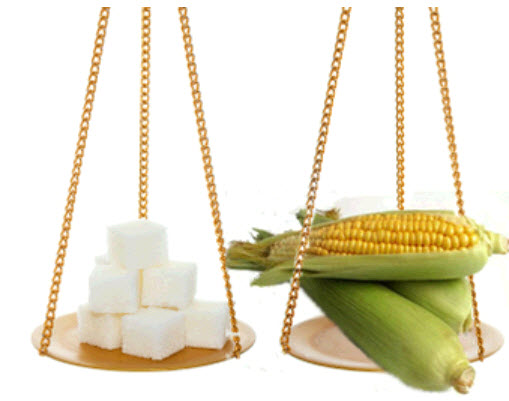Are Natural Sugars Better than High Fructose Corn Syrup?
It doesn’t take a rocket scientist to know Americans eat way too much sugar. But what can you use instead of regular sugar. It’s confusing with all the various sweeteners on the market from atifical to natural. If you are like many natural enthusiast you probably have booted out many of the artifical sweeteners like have. Aspartame, Splenda , and others.
However, what is confusing to many is the effects of many natural sugars such as agave. I mean after all isn’t Agave okay for diabetics or normal people who do not want to raise their blood sugar?
Dr. Steve Chaney, who teaches at UNC and runs a cancer research lab there write this article that may help clarify some of our questions on sugar; how much and what is the best.
The Real Facts on Sweetners
by Dr. Steve Chaney
 The American Heart Association recommends no more than 100 calories/day of added sugar for women and 150 for men. And one recent study concluded that 78% of women and 67% of men consume too much sugar every day (J. Nutr, 140: 1832, 2010).
The American Heart Association recommends no more than 100 calories/day of added sugar for women and 150 for men. And one recent study concluded that 78% of women and 67% of men consume too much sugar every day (J. Nutr, 140: 1832, 2010).
But the real question is which matters more – the type of sugar or the type of food
The answer is both – but let me explain.
Let’s start with the type of foods. You’ve probably heard that sugar sweetened beverages are not good for you.
Is that correct? The answer is clearly yes.
Several studies have shown that people drinking sugar sweetened beverages on a daily basis gain more weight than those who drink them only occasionally (For example, JAMA, 292: 927, 2004; Am J Clin Nutr, 89: 438, 2009).
Now let’s look at the type of sugar, but first let me give you a little background.
Back in the 60s and 70s, sugar sweetened beverages foods primarily contained sucrose (table sugar) or glucose (also known as dextrose). And a number of studies showed that beverages containing a lot of those sugars caused obesity and resulted in high blood triglycerides. As a result sucrose and glucose were vilified and the food industry largely replaced them with high fructose corn syrup.
Well today fructose and high fructose corn syrup are the sugars that are vilified. Some “experts” will tell you to avoid them at all cost.
Is that recommendation accurate? Here the answer is more complex. It is clearly true for sugar sweetened beverages, may be true for “junk foods”, but is probably not true for healthy foods. More importantly, most other natural sugars are no better.
The “knock” on fructose and high fructose corn syrup is that they increase visceral fat (also known as belly fat), which increases the risk of insulin resistance, elevated triglycerides and type 2 diabetes – among other things.
The data supporting this concern are quite strong. Numerous studies have shown that when people are given beverages sweetened with fructose or high fructose corn syrup they gain more belly fat than people given beverages sweetened with glucose (J Clin Invest, 119: 1322, 2009; Am J Clin Nutr, 95: 283, 2012; cdc.gov/nchs/data/databriefs/db71.htm).
Other studies have shown that high consumption of sugar sweetened beverages (mostly sweetened with high fructose corn syrup in today’s world) was associated with increased risk of diabetes (Diabetes Care, 33: 2477, 2010) and heart attack (Am J Clin Nutr, 89: 1037, 2009).
So you might say: “Case closed. Fructose and high fructose corn syrup should be avoided at all cost”.
But the first question is: “What would you use in their place?”
The Answer May Surprise You
It turns out that honey, molasses, maple syrup, orange, apple or grape juice concentrate (used as natural sweeteners in a lot of “health” foods), table sugar (sucrose), raw sugar, evaporated cane juice and brown sugar all have an almost identical sugar composition as high fructose corn syrup. And agave sugar is 88% fructose.
That just leaves glucose/dextrose, and we learned that it was bad for us way back in the 70s.
And clinical studies show that those similarities in sugar composition result in similar detrimental health consequences. For example, in one study people consuming beverages with sucrose gained just as much belly fat as people consuming beverages with fructose (Am J Clin Nutr, 94: 479, 2011). In other studies people consuming large amounts of fruit juice had just as much risk of obesity and diabetes as those consuming large amounts of sodas (Am J Clin Nutr, 89: 438, 2009; Int J Obesity, 24: 794, 2000).
And don’t think that artificial sweeteners are the way out. Although recent studies have shown that in a very controlled environment in which consumption of diet sodas actually resulted in decreased calorie intake people lost weight by switching from sugar sweetened sodas to diet sodas, in the real world we don’t have a dietitian peering over our shoulder. We appear to compensate for the decreased calories in the diet sodas by consuming extra calories somewhere else.
In real world studies people gain just as much weight drinking diet sodas as sugar sweetened sodas (Dhingra et al, Circulation, 116: 480-488, 2007; Fowler et al, Obesity, 16:1894-1900, 2008).
But the big caveat is that all of these studies have been done with beverages. We suspect that the same effects will be seen in sugar sweetened junk foods – foods low in fiber and protein – but those studies have not actually been done.
But when you start talking about healthy foods, it’s a whole different story.
We’ve known for years that the same amount of sugar can cause a large spike in blood sugar and triglyceride levels if consumed in a soda, fruit juice or junk food, but causes a much smaller increase in blood sugar and triglycerides if consumed in a healthier food containing lots of fiber and protein. That is the science behind the “glycemic index” concept that you’ve been hearing so much about.
Similarly, fructose appears to cause obesity and an increase in belly fat when consumed in sodas and fruit juices, but the same amount of fructose has little or no effect on either obesity or belly fat when consumed in fruits.
So what is the bottom line for you?
1) There are no good sugars, only good foods. If you are talking about sugar sweetened beverages (sodas, juices or teas) honey, molasses, fruit juice concentrates and sucrose are no healthier than high fructose corn syrup. And agave sugar is no healthier than pure fructose. Experts recommend drinking water, tea and coffee, and for the tea and coffee keeping sweeteners to the minimum.
2) Artificially sweetened sodas don’t appear to be any better than the sugar sweetened variety. In free living populations they are just as likely to be associated with weight gain. And, of course, they are just as likely to dissolve your bones as the regular sodas.
3) Although some experts will tell that artificial sweeteners are safe, I don’t recommend any of them. They all have unresolved health issues. And since they don’t appear to prevent obesity, my question is: “Why would you want to use them”.
The only non-nutritive sweetener that I recommend is stevia. But if you use stevia sweetened foods or beverages you need to be a careful label reader. Because stevia has a bit of an aftertaste many foods advertising that they are sweetened with stevia actually contain a combination of stevia and artificial sweeteners.
4) Although much more research in this area is needed, it appears that the kind of sugar you are getting is much less important than the food you are getting it in. Sugars are a natural component of many healthy foods such as fruits and dairy products, and sugars in these foods are not associated with obesity and other health problems. Although we don’t know the exact mechanism, it is thought that the protein and fiber in healthy foods slow the absorption of sugars and alter their metabolism.
Editors Note: I like to use Erythitol because it has a more natural sugar taste. It is fermented from corn. In order to find non GMO corn go to Saraya Corporation who has taken the extra step to make their product from non GMO corn. Another good sweetner that you can find is Lankanto that is made from erythitol and luo han guo fruit from China.
However, you need to watch the amount you use because it can give one loose bowels but when use moderately you shouldn’t have any issues. I remember one time I wanted to avoid putting sugar in a cranberry salad I was making and put enough xylitol to sweeten the cranberries…results NOT a good thing…I got a good cleansing the hard way.
Would love you comments

